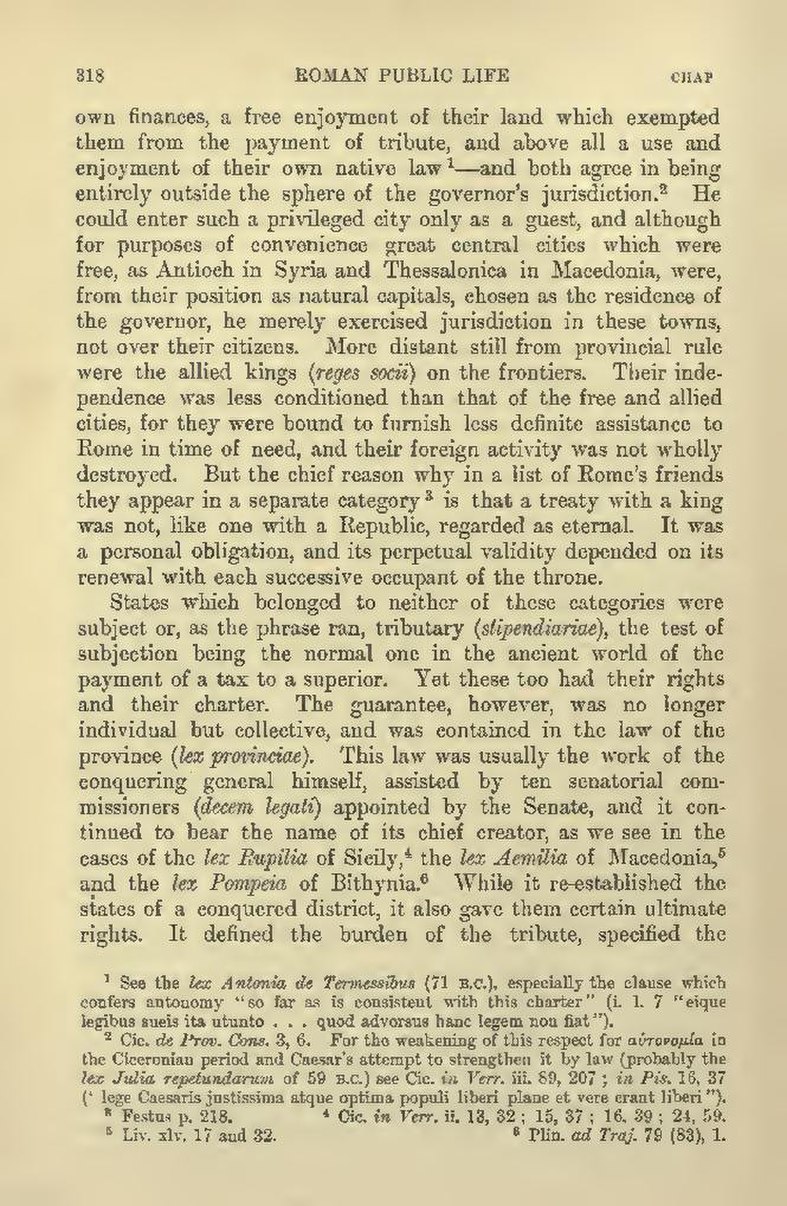own finances, a free enjoyment of their land which exempted them from the payment of tribute, and above all a use and enjoyment of their own native law[1]—and both agree in being entirely outside the sphere of the governor's jurisdiction.[2] He could enter such a privileged city only as a guest, and although for purposes of convenience great central cities which were free, as Antioch in Syria and Thessalonica in Macedonia, were, from their position as natural capitals, chosen as the residence of the governor, he merely exercised jurisdiction in these towns, not over their citizens. More distant still from provincial rule were the allied kings (reges socii) on the frontiers. Their independence was less conditioned than that of the free and allied cities, for they were bound to furnish less definite assistance to Rome in time of need, and their foreign activity was not wholly destroyed. But the chief reason why in a list of Rome's friends they appear in a separate category[3] is that a treaty with a king was not, like one with a Republic, regarded as eternal. It was a personal obligation, and its perpetual validity depended on its renewal with each successive occupant of the throne.
States which belonged to neither of these categories were subject or, as the phrase ran, tributary (stipendiariae), the test of subjection being the normal one in the ancient world of the payment of a tax to a superior. Yet these too had their rights and their charter. The guarantee, however, was no longer individual but collective, and was contained in the law of the province (lex provinciae). This law was usually the work of the conquering general himself, assisted by ten senatorial commissioners (decem legati) appointed by the Senate, and it continued to bear the name of its chief creator, as we see in the cases of the lex Rupilia of Sicily,[4] the lex Aemilia of Macedonia,[5] and the lex Pompeia of Bithynia.[6] While it re-established the states of a conquered district, it also gave them certain ultimate rights. It defined the burden of the tribute, specified thein the Ciceronian period and Caesar's attempt to strengthen it by law (probably the lex Julia repetundarum of 59 B.C.) see Cic. in Verr. iii 89, 207; in Pis. 16, 37 ('lege Caesaris justissima atque optima populi liberi plane et vere erant liberi").]
- ↑ See the lex Antonia de Termessibus (71 B.C.), especially the clause which confers autonomy "so far as is consistent with this charter" (i. l. 7 "eique legibus sueis ita utunto . . . quod advorsus hanc legem non fiat").
- ↑ Cic. de Prov. Cons. 3, 6. For the weakening of this respect for [Greek: autonomia
- ↑ Festus p. 218.
- ↑ Cic. in Verr. ii. 13, 32; 15, 37; 16, 39; 24, 59.
- ↑ Liv. xlv. 17 and 32.
- ↑ Plin. ad Traj. 79 (83), 1.
